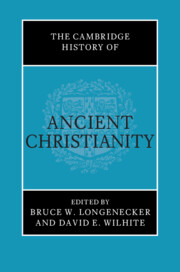Book contents
- The Cambridge History of Ancient Christianity
- The Cambridge History of Ancient Christianity
- Copyright page
- Contents
- Figures
- List of Contributors
- Editors’ Preface
- Part I Contested Contexts
- Part II Contested Figures
- 5 Remembering Jesus in Earliest Christianity
- 6 Remembering Jesus in the Second and Third Centuries CE
- 7 Paul and His Diverse Champions
- 8 Peter and His Diverse Champions
- Part III Contested Heritage
- Part IV Contested Cultures
- Part V Contested Beliefs
- Part VI Contested Bodies
- Ancient Sources
- Modern Authors
- References
7 - Paul and His Diverse Champions
from Part II - Contested Figures
Published online by Cambridge University Press: 23 August 2023
- The Cambridge History of Ancient Christianity
- The Cambridge History of Ancient Christianity
- Copyright page
- Contents
- Figures
- List of Contributors
- Editors’ Preface
- Part I Contested Contexts
- Part II Contested Figures
- 5 Remembering Jesus in Earliest Christianity
- 6 Remembering Jesus in the Second and Third Centuries CE
- 7 Paul and His Diverse Champions
- 8 Peter and His Diverse Champions
- Part III Contested Heritage
- Part IV Contested Cultures
- Part V Contested Beliefs
- Part VI Contested Bodies
- Ancient Sources
- Modern Authors
- References
Summary
The Pauline Epistles, or some portion of them, provide a remarkably early picture of the Christ movement as it spread through Asia Minor and Greece in the 40s and 50s ce.1 They render evidence that only a decade or two into the movement’s existence there were serious tensions developing around fundamental problems of Christian identity and culture. Several questions are of primary concern in our earliest Christian documents.2 How will Gentiles be incorporated into Israel’s eschatological salvation? What is their obligation to Torah? How are prior identities transformed “in Christ”? What obligations do members of Christ’s body have to one another? What can followers of Jesus expect to encounter from a world controlled by hostile principalities and powers? One does not have to read between the lines of the Epistles to understand that their author, a diaspora Jew with a zealous past, was more than a little responsible for the factions developing around these issues.
- Type
- Chapter
- Information
- The Cambridge History of Ancient Christianity , pp. 154 - 174Publisher: Cambridge University PressPrint publication year: 2023

